If you’re just starting to do SEO for your website, you may be—well, running out of patience, first of all—but also wondering exactly how long SEO takes to actually work. To actually get a little pay off for your efforts.
Well, the honest answer is that it depends. But it doesn't work instantly, that much is certain. Without any social media help or external link building, you’re looking at at least 7-14 days until search bots have crawled and returned it for relevant queries (although you won’t be on page one—more like page nine or 10 if you’re lucky.) And that’s with a page or post that is well-written, well-linked and includes proper on-page SEO.
Looking for other beginner SEO tips? Check out our post: What is SEO? A Primer on Search Engine Optimization.
How Long Does it Take to Get to the Front Page of Google?
Now, that’s just how long it takes to get a piece of content “ranked”, not how long it takes to get a piece of content “ranked high”. Let’s say you want to hit the first page of Google. How long will that take?
Again—it depends. BUT, if it’s an interesting piece of content that serves your audience, you can generally expect to rise about 10 rankings a month with a little effort. So, if you’re currently on page four, in four months you could see it on page one. This is assuming that you’re doing everything from implementing meta descriptions to linking it internally to optimizing page speed to targeting keywords and beyond.
How to Speed Up the SEO Process
While Google won’t index your website’s content immediately, there are a few things you can do to improve your performance in search engine results.
Get Better at Writing
Without a doubt, the more quality content you post, the higher your site will rank. “Quality” is the key word here (no pun intended). You can’t post content that is poorly written, not edited, doesn’t contain visuals and expect it to perform well. It, in fact, will hurt your website rank. It’s well-known in the industry that one good piece of content is worth way more than 20 pieces of poor-quality content. So, you’ll have to practice. You’ll have to become a master ink slinger (and using a thesaurus is a good idea as well.)
Looking for help with SEO copywriting? Take a look at our mega post: 25 Copywriting Best Practices.
Then, Write & Post a Ton
Not only do the top search results on Google have a certain length to them, the most successful websites are constantly pumping this content out. Writing more content will improve your overall website rankings and support internal pages by increasing the keyword net, links and “freshness” of your website. Plus, as more content is developed, traffic grows and you can see which topics people tend to be interested in. Take those topics and push them further with new content.
So, here’s the formula you need to remember:
Quality + Length + Frequency = SEO Ranking Success
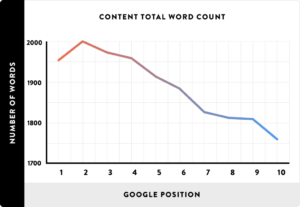 We already covered quality. Length refers to how many words, visuals/videos you can fit into an article. Of course, you don’t want to write just for the sake of writing, but generally, the longer the better. The top-performing content across industries sits at just under 2,000 words.
We already covered quality. Length refers to how many words, visuals/videos you can fit into an article. Of course, you don’t want to write just for the sake of writing, but generally, the longer the better. The top-performing content across industries sits at just under 2,000 words.
Frequency is also underestimated. Of course, posting a lot of content takes resources, whether it’s your time or paying someone else to do it. However, when you get on a creative roll, increased SEO metrics will roll right along with you.
Targeting Keywords
And let’s not forget about the thing that started it all – keywords. Sometimes, it’s important to target keywords, and sometimes it’s not, it just depends on what you’re trying to accomplish.
For example, if you have something that serves a narrow niche but you know that the people who are interested in it would love it, I wouldn’t add any keywords and let the natural semantics come through in the article. However, if you’re trying to overcome a competitor in search engines so that you show up first in the local map pack, then I would lace that thing in low-competition/high-volume terms.
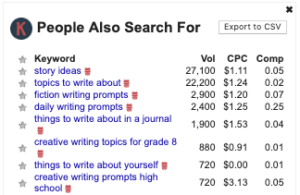
There are a few easy ways to find keywords that any beginner can use to help them develop content. The first thing you can do is to download Chrome and install the extension “Keywords Everywhere”. This simple little tool will give you a ton of ideas when you search for a given term, popping up in a sidebar on the search engine result page, with no effort on your part at all. I’ve compared the data of the keywords it spits out by cross-checking them with Google’s Keyword Planner, and they’re essentially the same, so you don’t have to worry about suspicious search volume and competition.
Do you like this tip? Find more by reading our post, 8 SEO Copywriting Tips to Help You Rank.
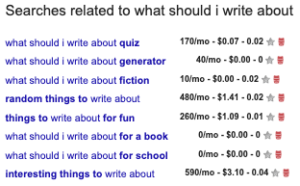 Another good way to find keyword-based ideas on what to write is to just look at the similar searches within the Google search bar or at the bottom of the search engine results page itself. If you wrote a blog, “What Should I Write About,” you can use any of those related keywords in your body copy, header tags, meta description, etc. Plus, you can link back and forth for the link juice: which brings me to my next piece of advice.
Another good way to find keyword-based ideas on what to write is to just look at the similar searches within the Google search bar or at the bottom of the search engine results page itself. If you wrote a blog, “What Should I Write About,” you can use any of those related keywords in your body copy, header tags, meta description, etc. Plus, you can link back and forth for the link juice: which brings me to my next piece of advice.
Internal Linking Goes a Long Way
Is there a page on your website that you want to rank high? Higher than the others, let’s say? Then you have to link to it from other relevant pages on your website. This keeps search crawlers hopping between your related pieces of content via a keyword-oriented anchor text, keeping them activated on your website. Search crawlers will give more authority to the page that has the most links pointing to it. That’s where they are being sent the most and that's what they're spending the most time crawling. Make sense?
If not, here's a little more detail via Neil Patel:
<iframe width="560" height="315" src="https://www.youtube.com/embed/B_P2cxJdnik?start=13" frameborder="0" allow="accelerometer; autoplay; encrypted-media; gyroscope; picture-in-picture" allowfullscreen></iframe>
Most of the time, the highest driver of traffic on your website will be the homepage. This is because it naturally attracts internal links and is the face of your brand online. But maybe you want a piece of content that converts higher, like a services page. If you make a conscious effort to link internally to a certain page via keyworded anchor text you can actually force it to rank above your homepage.
Are you trying to make your homepage more SEO friendly? Read our article, Writing a Homepage that Converts.
Gaining External Links
Gaining external links is one of the most difficult aspects of a strong, comprehensive SEO strategy, but when done right, it will skyrocket your rankings in Google. Essentially what you’ll do is send out a bunch of emails to webmasters and a bunch of guest post pitches—and you’ll mostly likely hear crickets to start. But, let’s not get discouraged. There are two main ways to get started with linkbuilding:
- Guest blogging: This is the practice of pitching editors who operate publications within your business’ space and writing an article for them. If it goes well, you may have access to the backend of a quality website where you can post as much as your heart desires.
To start, first search “top [insert industry/niche here] blogs + [your target keyword]” and make a list of publications. Go to their “contact” page or find something that says “write for us” or “contribute”, yada-yada. They will most likely give you a certain set of guidelines you have to follow, from word count to topic to language. If they have an editor’s email address listed, you’re in luck. Send three to four short pitches that follow their guidelines and speak to their audience.
Guest Blogging Pitch Email Example
Hi, Editor of Interest,
I hope you’re having a good week. (or insert other basic greeting).
I am a [title] for [insert company, samples or portfolio], and I would like to write a guest post for your website [insert target’s brand name / website URL]. I came across your website and think that the subject matter is right up my alley. I have a few article topics that I think your audience would love:
- 5 Tips on Ranking Higher in Google: I will discuss on-page SEO tips that will make content show up higher in search engines.
- How to Build a More Profitable Website with SEO: I will do a deep dive on SEO strategies and how they contribute to a company’s bottom line on the web.
- What To Do When Your Rankings Fall Short: I will give guru-level readers information on how to deal with clients when rankings fall short of expectations.
If you are interested in any of these, I can send you more detailed pitches, an outline, or get started writing right away.
Thanks for your time, I look forward to hearing back.
[Your Name]
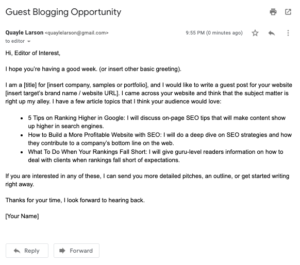 See? Easy. Short. Simple. Everything fits nicely above the fold. These editor types are busy people, so the more succinct you can keep it, the better. Also, start small with niche trade publications, online forums, directories – things of that nature. If you’re a new website or unknown brand with no authority, you have little chance at guesting for Forbes or The Atlantic. If you don’t hear back, don’t get discouraged. Popular publications especially will most likely not respond quickly, so follow up in a week or so.
See? Easy. Short. Simple. Everything fits nicely above the fold. These editor types are busy people, so the more succinct you can keep it, the better. Also, start small with niche trade publications, online forums, directories – things of that nature. If you’re a new website or unknown brand with no authority, you have little chance at guesting for Forbes or The Atlantic. If you don’t hear back, don’t get discouraged. Popular publications especially will most likely not respond quickly, so follow up in a week or so.
- Getting link placements: This linkbuilding strategy deals with you reaching out to webmasters and getting your content linked through their content. First, search your keyword in Google. Go through the websites to find content that matches with yours and that include your keyword. Try to find the contact information of the webmaster, hopefully something better than an info@website.com address. The lowest-hanging fruit is most likely going to be a listicle – something along the lines of “Top 40 Foodie Blogs on the Internet”, for instance.
Drop them a note, saying something along the lines of:
Hi, so-and-so,
My foodie blog, “It’s All Rice By Me” has been gaining traction lately. I think that your readers will greatly benefit from my blog, because of [insert reason(s) here]. Would you consider including it in your article, “Top 40 Foodie Blogs on the Internet?”
Thank you, I look forward to hearing your response.
[Your Name]
Of course, these are just a couple of the ways to gain links – check out our post 8 Linkbuilding Strategies You Should Employ to find out more about gaining external links.
Conduct a Content Audit
This will apply only to websites that have a decent amount of content already, but is good practice anyway. Content audits are important because they examine all of the pages on your website, and tell you straight to your face which ones suck. To cut down on the time it takes to rank a piece of content, it may help to run your website through a website auditing tool to identify which pieces of content need to be consolidated or removed.
Looking for a tool that will work for you? Check out our post, 15 Website Auditing Tools.
If you have low-quality, low-performing pages that aren’t driving traffic, they can actually hurt your search rankings. For pages that don’t get visitors, have a low word count, or are irrelevant to your brand, you have a couple options:
- Improve the page by adding more words, images, on-page SEO elements and links.
- Take that copy and move it over to a higher-performing page that relates to the topic.
- Remove the content completely and put a 301 redirect that points to a similar page.
At the very least, you probably have some archive or tag pages that are automatically created when you post blogs via WordPress. Those pages are notorious for producing duplicate content, which is a big no-no, and should be pointed elsewhere with a canonical tag. Check your duplicate content at siteliner.com (example below).
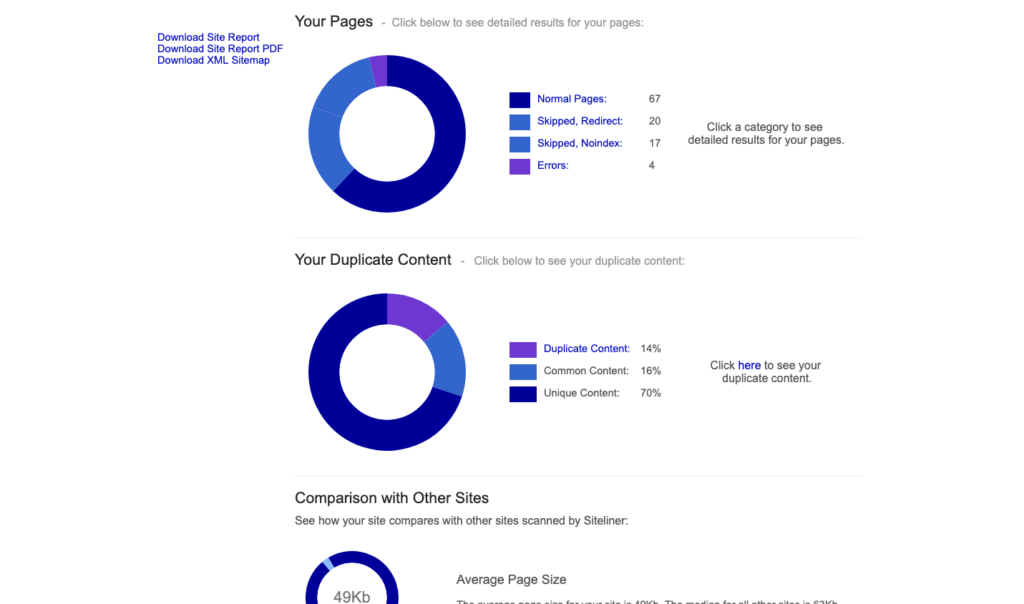
How Long Does SEO Take? In Conclusion
Sorry to say that there is no concise answer as to how long SEO takes to show results. It depends on a multitude of factors that will take anywhere from a week to three months and more for those just starting out.
However, there are many things you can do to speed the process up, from auditing to linkbuilding to better copywriting and beyond. All it takes is attention to detail and an extra hour of work each day doing writing, outreach and content optimization.
As always, if you need help, reach out to Minneapolis search optimization agency, Frahm Digital. Whether you need web design, SEO, copywriting or other digital services, our team is ready to take on your unique project and get you to the first page of Google.
Get in touch with us today by filling out a contact form.

